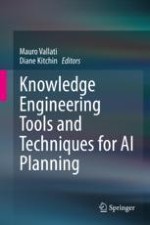
2020 | OriginalPaper | Buchkapitel
1. Explanation-Based Learning of Action Models
verfasst von : Diego Aineto, Sergio Jiménez, Eva Onaindia
Erschienen in: Knowledge Engineering Tools and Techniques for AI Planning
Aktivieren Sie unsere intelligente Suche, um passende Fachinhalte oder Patente zu finden.
Wählen Sie Textabschnitte aus um mit Künstlicher Intelligenz passenden Patente zu finden. powered by
Markieren Sie Textabschnitte, um KI-gestützt weitere passende Inhalte zu finden. powered by